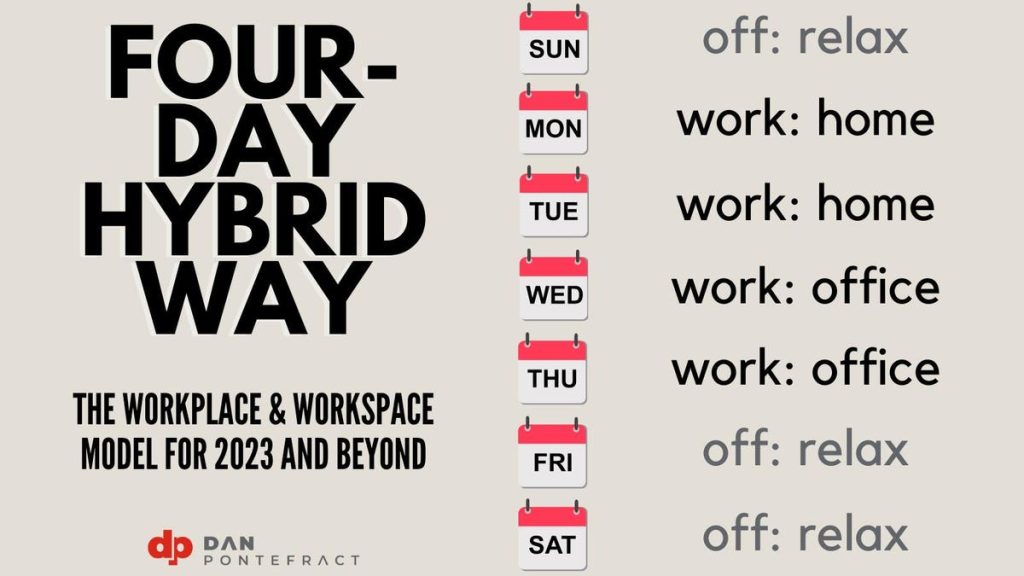Imagine a workplace model that combines the flexibility of remote work with the rich, dynamic interactions of an office environment, all within a rejuvenating four-day workweek. The idea isn’t a fanciful dream but one that might revolutionize the workplace and workspace. I call it the “Four-Day Hybrid Way.”
By synergizing these two concepts, organizations can likely foster two critical ideas that aid the employee experience and become an attraction and retention weapon against coveted Gen Z and Millennial talent.
Background
Numerous studies and successful trials vouch for the four-day workweek’s efficacy. Rather famously and well before the pandemic hit, Microsoft Japan’s 2019 experiment, where the company reported a 40% increase in productivity when they shifted to a four-day workweek.
The consulting firm, 4 Day Week Global, has also been tracking various four-day workweek efforts. For example, data collected against 33 companies and 903 employees in the US, Ireland, and a few other countries in 2022 discovered that employee performance, when compared to their lifetime best, saw the average score rise from 7.17 at baseline to 7.83 at the end of the trial.
Organizations made a sweeping shift towards remote work when the world grappled with the pandemic. This change highlighted a strong preference among employees for flexible work arrangements, with a Stanford University study reporting a 13 percent productivity increase among remote workers.
In 2023, the National Bureau of Economic Research (NBER), when quantifying across 27 countries the commute time savings associated with remote work, found that the average daily time savings when working from home was 72 minutes in our sample. Interestingly, NBER stated that “workers allocate 40 percent of their time savings to their jobs,” which equates to an extra 29 minutes of productivity per day.
However, while remote work holds undeniable benefits, the value of face-to-face interaction remains vital, a sentiment echoed by 81 percent of remote workers in a 2021 BCG report.
In Progress
Prominent leaders are championing these revolutionary shifts. Andrew Barnes, CEO of Perpetual Guardian, a firm that successfully transitioned to a four-day workweek, once stated, “Our engagement went up 40 percent and our stress levels went down 15 percent. But most importantly, we became 125 percent more productive. Let us be clear what this [four-day workweek] is about: 100 percent pay, 80 percent time, as long as we get 100 percent output.”
At Ellevest, a women-centric financial platform, CEO Sallie Krawcheck believes in the good that can come from a hybrid work model. She said, “Our culture revolves around our really strong shared mission of getting more money into the hands of women. There’s no confusion about our mission and culture, and it has nothing to do with people being in the office or not.”
Four-Day Hybrid Way
The model I propose blends these two innovative ideas:
- Mondays and Tuesdays: dedicated to remote or at-home work
- Wednesdays and Thursdays: dedicated to in-office collaboration
- Fridays: reserved for rest and relaxation
This structure offers the best of both worlds—the flexibility and convenience of working from home with the essential regular face-to-face interaction that nurtures team cohesion enhances communication, and reinforces organizational culture. We need face-to-face to happen again, but we can’t crush the team member’s desire for hybrid work.
Benefits
There are several compelling benefits to the Four-Day Hybrid Way model, spanning individual to organizational levels:
- Productivity: The comfort of working from home, combined with the energizing dynamics of the office environment, can significantly enhance employee productivity.
- Employee Interactions: Regular face-to-face collaboration nurtures creativity, solidifies interpersonal relationships, and drives engagement. Now, more than ever, we need face-to-face interactions to happen.
- Talent Retention and Attraction: Offering a flexible work model can serve as a competitive advantage in attracting and retaining top talent. However, Owl Labs found in 2022 that if the ability to work from home were taken away, two-thirds (66 percent) of workers would immediately start looking for a job that offered flexibility, and 39 percent would simply quit.
- Work-Life Bloom: The hybrid four-day workweek can enable team members and leaders to manage their professional responsibilities alongside personal commitments effectively, arguing for the chance to bloom in both.
- Cost Efficiency: Businesses can reap significant cost savings through remote work. Global Workplace Analytics estimates that businesses can save around $11,000 annually per employee working from home half the time.
- Environmental Impact: By reducing commuting, we contribute to environmental sustainability, helping reduce carbon emissions and easing traffic congestion. Also via Global Workforce Analytics, the firm estimates that half-time remote work could reduce greenhouse gas emissions by 54 million tons annually.
In Summary
We can’t ignore the holistic benefits that the Four-Day Hybrid Way model brings to the table. It offers a thoughtful balance, intertwining the autonomy and flexibility of remote work with the desperately needed camaraderie and connectivity of in-person collaboration.
Moreover, the four-day workweek component of this model offers a refreshing break from the traditional five-day grind, resulting in rejuvenated employees come Monday, ready to take on the week’s challenges. This approach acknowledges the importance of rest, promoting a culture where employees’ wellbeing is as significant as their output.
This shift towards the Four-Day Hybrid Way requires courage, vision, and commitment from leaders. By exploring and embracing such a model, we are not only leading our organizations but also making a societal impact that extends far beyond the confines of our offices. We’re redefining work culture, setting a progressive pace for others to follow, and, most importantly, putting our people at the heart of our organizational culture.
As leaders, it is our responsibility to ensure we’re creating an environment that supports our teams’ wellbeing, cultivates their skills, and fosters their growth. In doing so, we take into account their personal lives and the absolute need to have people face-to-face so important aspects of coaching, skills transfer, and general gossip and chitchat can transpire.
The Four-Day Hybrid Way model is a win-win approach that honors employees’ needs while propelling business requirements. As leaders, we hold the reins to make this future a reality and set a benchmark for others to follow.
In the spirit of the famous words of Steve Jobs, “The people who are crazy enough to think they can change the world are the ones who do.” Let’s be those ‘crazy ones’—the ones who take the bold step toward reshaping the future of work to the benefit of all.
By embracing the model, we are not only leading our organizations into the future but also contributing to a more significant societal shift that values people’s time, wellbeing, and fulfillment in equal measure to productivity and output. The future of work is indeed ours to shape.
Let’s make it the “Four-Day Hybrid Way.”
_______
Pre-order my next book, publishing in November, Work-Life Bloom: How to Nurture a Team That Flourishes, (You won’t want to miss digging in.)
Read the full article here










